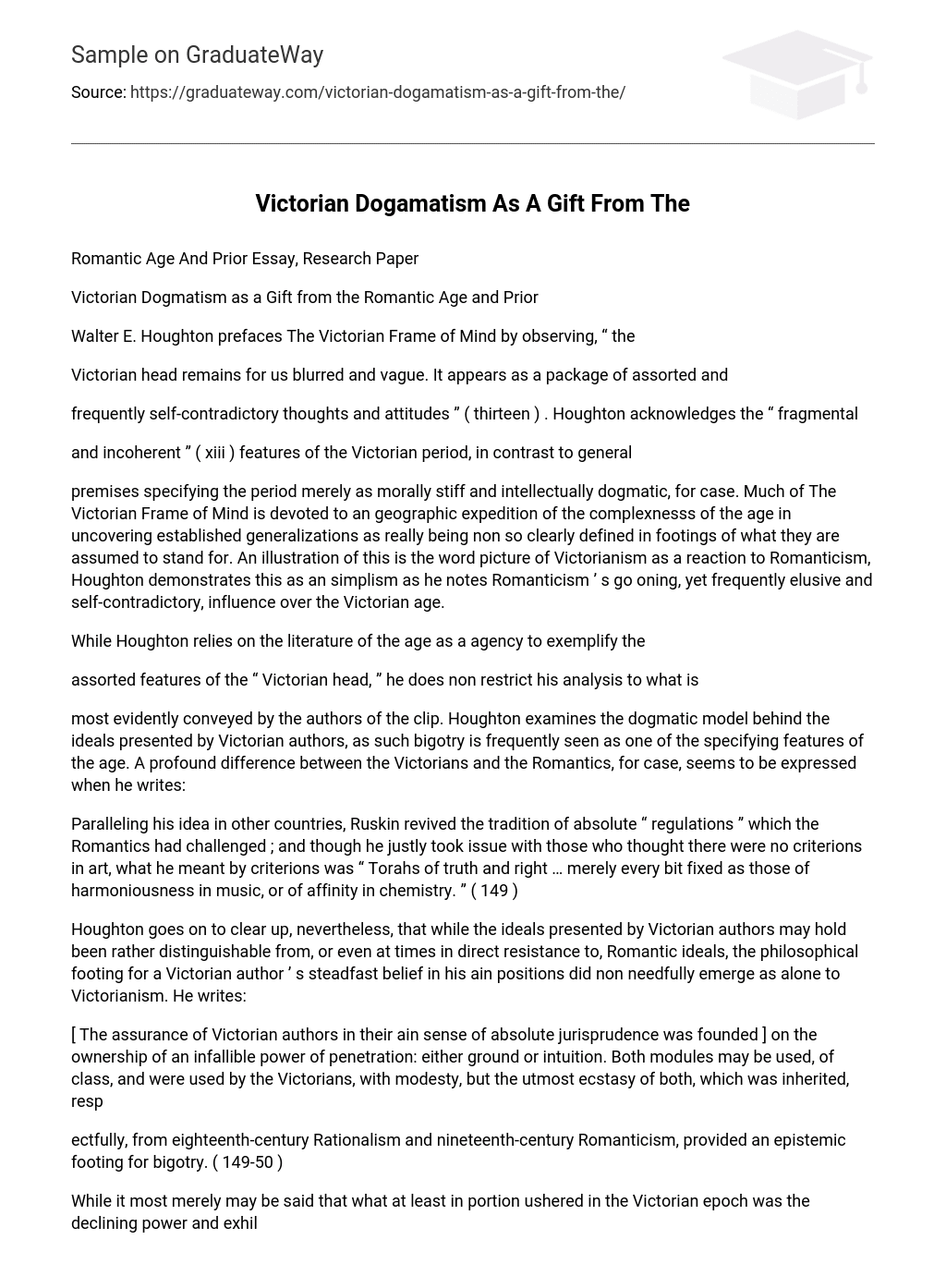Walter E. Houghton prefaces The Victorian Frame of Mind by observing, “ the Victorian head remains for us blurred and vague. It appears as a package of assorted and frequently self-contradictory thoughts and attitudes ” ( thirteen ) . Houghton acknowledges the “ fragmental and incoherent ” features of the Victorian period, in contrast to general premises specifying the period merely as morally stiff and intellectually dogmatic, for case.
Much of The Victorian Frame of Mind is devoted to an geographic expedition of the complexnesss of the age in uncovering established generalizations as really being non so clearly defined in footings of what they are assumed to stand for. An illustration of this is the word picture of Victorianism as a reaction to Romanticism, Houghton demonstrates this as an simplism as he notes Romanticism ’ s go oning, yet frequently elusive and self-contradictory, influence over the Victorian age.
While Houghton relies on the literature of the age as a agency to exemplify the assorted features of the “ Victorian head, ” he does non restrict his analysis to what is most evidently conveyed by the authors of the clip. Houghton examines the dogmatic model behind the ideals presented by Victorian authors, as such bigotry is frequently seen as one of the specifying features of the age. A profound difference between the Victorians and the Romantics, for case, seems to be expressed when he writes:
Paralleling his idea in other countries, Ruskin revived the tradition of absolute “ regulations ” which the Romantics had challenged ; and though he justly took issue with those who thought there were no criterions in art, what he meant by criterions was “ Torahs of truth and right … merely every bit fixed as those of harmoniousness in music, or of affinity in chemistry. ” ( 149 )
Houghton goes on to clear up, nevertheless, that while the ideals presented by Victorian authors may hold been rather distinguishable from, or even at times in direct resistance to, Romantic ideals, the philosophical footing for a Victorian author ’ s steadfast belief in his ain positions did non needfully emerge as alone to Victorianism.
He writes: The assurance of Victorian authors in their ain sense of absolute jurisprudence was founded ] on the ownership of an infallible power of penetration: either ground or intuition. Both modules may be used, of class, and were used by the Victorians, with modesty, but the utmost ecstasy of both, which was inherited, resp ectfully, from eighteenth-century Rationalism and nineteenth-century Romanticism, provided an epistemic footing for bigotry. ( 149-50 )
While it most merely may be said that what at least in portion ushered in the Victorian epoch was the declining power and exhilaration of the Romantic revolution in poesy, Houghton, nevertheless, notes that portion of that power and exhilaration was still working for the Victorian authors. Such power comes in the signifier of a bigotry that was non needfully new to the age, but possibly more marked than of all time before because of its heritage from the Romantic authors and even their predecessors.
Houghton explains: a [ Victorian ] author could barely get away going a all right doctrinaire, was created by the transmutation, under philosophical or mystical influence, of the natural mastermind of the eighteenth-century – the poet who wrote spontaneously without cognition of classical literature or the regulations of art – into the Romantic Genius of the 19th whose imaginativeness was an oracular organ of Truth. This judicious philosophy, preached by Wordsworth and Shelley every bit good as by Goethe and Fichte, was adopted from those beginnings by the Cambridge Apostles. ( 152 )
Houghton examines the dogmatic tone of plants by Victorian authors such as Tennyson, Browning, Arnold, Newman, and particularly Carlyle ( 151-54 ) and remarks on its attractive force during the Victorian epoch which may, in portion, history for its looking more-pronounced presence when compared to the Romantic or earlier periods. While the bigotry of the Romantics may hold been pressing readers toward a belief in the spiritualty to be found in nature, for case, Houghton notes that Victorian bigotry had possibly a greater undertaking at manus – a filling of the nothingness left by emerging godlessness and polish of scientific idea. He indicates that dogmatic philosophy to the Victorians “ was non merely natural ( given the clime of sentiment ) – it was attractive. They liked it. One might even state they asked for it.
The Prophetss who put on the mantle of infallibility did so every bit much from public demand as from a personal sense of fittingness ”. Intellectual bigotry, in a sense, became the “ new faith ” for many during the Victorian age. Houghton ’ s scrutiny of Victorian rational bigotry reveals it to be non so much a dramatic contrast to Romantic revolution in poesy, for illustration, but instead, the following measure, how of all time more marked, of that same bigotry that was practiced by the Romantics and their predecessors.
Bibliography
- Houghton, Walter Edwards. The Victorian Frame of Mind 1830-1870.





